How Investment Software Solutions Are Transforming Modern Portfolio Management
Key Takeaways:
- From Spreadsheets to Smart Engines: Managing portfolios with software is like upgrading from a paper map to GPS—you’ll always know the best route forward.
- Automation as the Silent Workhorse: Think of automated reporting and reconciliations as the engine under the hood—quiet, powerful, and built to keep you moving.
- AI as Your Co-Pilot: With predictive insights and real-time alerts, AI acts like a co-pilot, helping you spot turbulence before it hits.
Not too long ago, portfolio managers relied heavily on spreadsheets to track investments, run calculations, and prepare reports. But as markets got more volatile, asset classes more diverse, and investor expectations more immediate, spreadsheets quickly started showing their limits. Today, the shift is clear: firms are moving from manual methods to intelligent, AI-powered portfolio management systems that are built to handle complexity at scale.
The pressure is real. Portfolio managers and investment firms need to track multiple asset classes, analyze risk in real time, ensure compliance, and deliver insights instantly to clients and stakeholders. That’s where investment software development solutions come in. By combining automation, advanced analytics, and artificial intelligence, these solutions act like a digital command center for modern portfolio management—streamlining workflows, reducing human error, and uncovering opportunities faster than ever before.
In fact, the adoption of financial software development services is no longer just a competitive edge; it’s becoming a survival tool in today’s fast-changing financial landscape. Firms that embrace these fintech software solutions are able to make better decisions, react to market shifts in real time, and strengthen client trust through transparency and accuracy.
In this blog, we’ll explore exactly how investment software solutions are transforming modern portfolio management—and give you a practical roadmap to leverage them for growth, resilience, and smarter investment strategies.
Understanding Modern Portfolio Management Challenges
If you talk to most portfolio managers today, they’ll tell you the same thing: the job has gotten a lot more complex than it was even a few years ago. What used to be manageable with spreadsheets and siloed applications is now a maze of data, global markets, and ever-changing regulations.
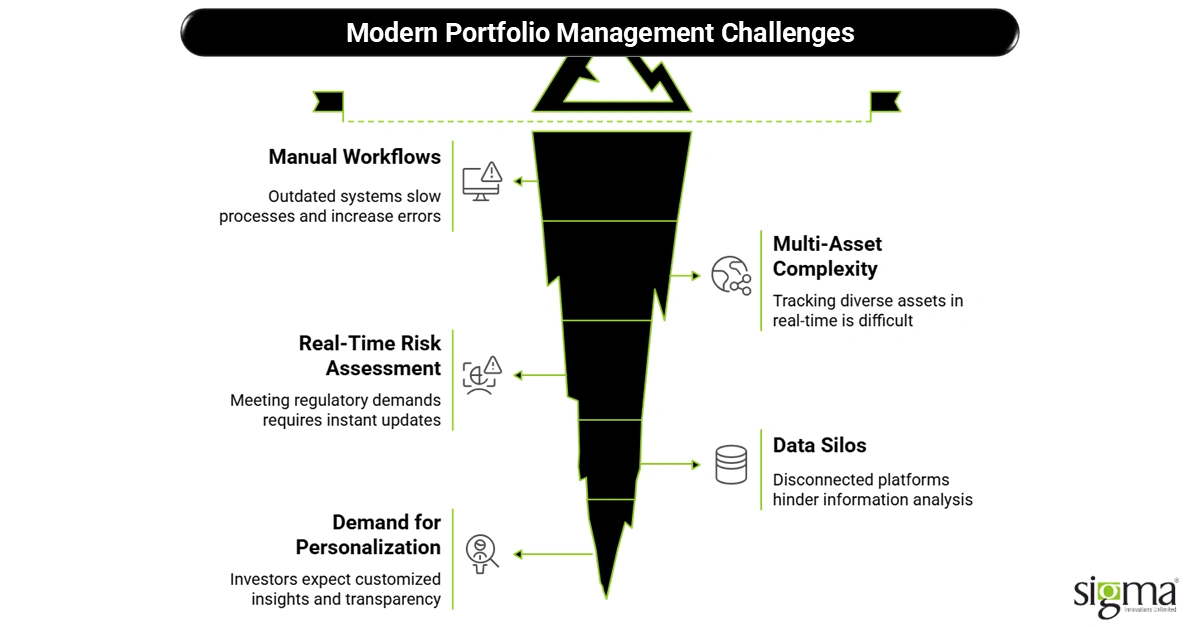
First, let’s talk about the obvious hurdle—manual workflows and legacy tools. Many firms still rely on outdated systems that can’t keep up with modern demands. The result? Slower processes, higher chances of error, and limited visibility across portfolios.
Add to that the complexity of multi-asset portfolios. Investors today don’t just hold stocks and bonds—they’re spread across global equities, crypto, private equity, real estate, and more. Tracking performance, risk, and correlations across all these asset classes in real time is nearly impossible without advanced investment software solutions.
Another major challenge is real-time risk assessment and compliance. Regulators want accurate, transparent reporting, while clients demand instant updates. Without integrated fintech software solutions, firms are stuck piecing together data from disconnected systems—a time-consuming and error-prone process.
And let’s not forget about data silos. When trading, risk, and reporting platforms don’t talk to each other, managers spend more time chasing information than analyzing it. This not only slows decision-making but also creates blind spots that can cost firms money and credibility.
Lastly, there’s the growing demand for personalization and transparency. Investors now expect customized insights, clear reporting, and dashboards that show them exactly what’s happening with their portfolios. Without the right investment software management tools, meeting these expectations becomes a daily struggle.
These challenges make it clear: traditional methods aren’t enough. The industry needs investment software development solutions that bring automation, integration, and intelligence into the heart of modern portfolio management.
Key Capabilities of Investment Software Solutions
So, how do investment software development solutions actually solve the problems we just discussed? It comes down to building systems with the right mix of features that don’t just patch issues but transform the way firms operate. At Sigma Infosolutions, we design financial software development services that bring together analytics, automation, AI, and compliance to give portfolio managers a true edge.
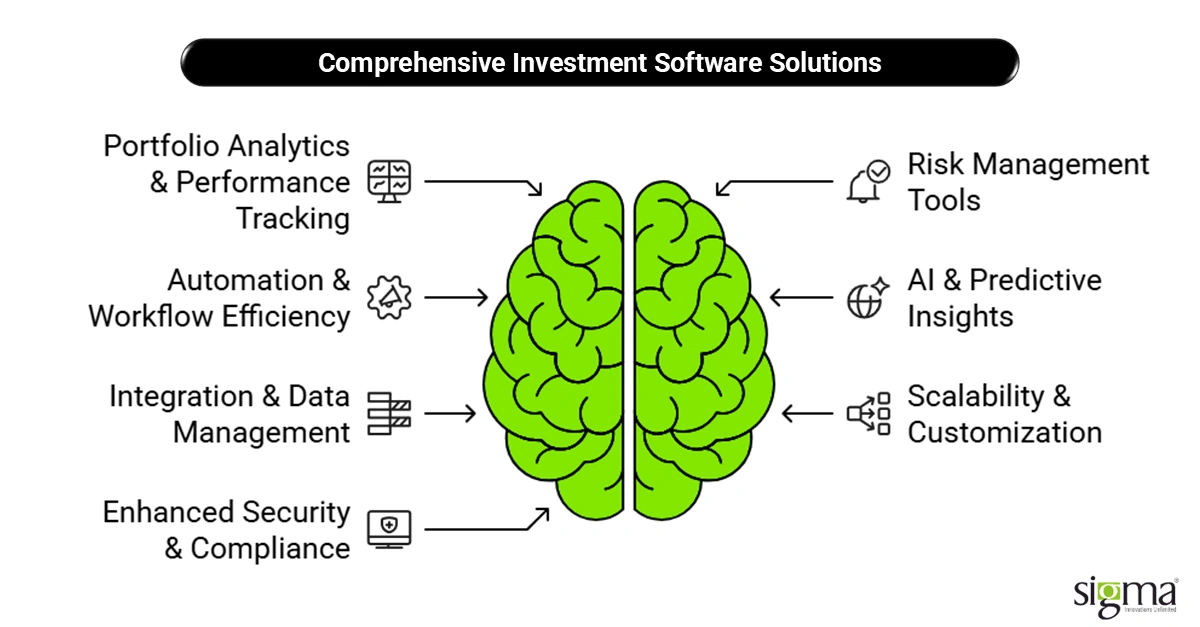
- Portfolio Analytics & Performance Tracking: Think of this as your portfolio’s dashboard. With real-time KPIs, benchmarks, and customizable performance dashboards, managers can track investments across multiple asset classes in one place. No more waiting for end-of-month reports—financial portfolio tracking software puts insights at your fingertips instantly.
- Risk Management Tools: Markets move fast, and risk exposure changes by the second. Our solutions include stress testing, scenario modeling, and compliance alerts that help managers stay one step ahead. Whether it’s a sudden market dip or a regulatory update, your system should flag it before it becomes a problem.
- Automation & Workflow Efficiency: Tasks like trade execution, reconciliation, and reporting eat up valuable time when done manually. With smart fintech software solutions, these processes are automated, cutting down errors and freeing managers to focus on strategy.
- AI & Predictive Insights: Using AI-driven forecasting, anomaly detection, and even market sentiment analysis, our fintech investment solutions provide predictive intelligence. It’s like having an always-on research analyst helping you spot opportunities and risks early.
- Integration & Data Management: Disconnected systems create silos. That’s why we build custom fintech software development that integrates seamlessly with CRMs, ERPs, trading platforms, and cloud storage. The result? A single source of truth across your operations.
- Scalability & Customization: Boutique firms and global enterprises have very different needs. Our investment software management solutions are fully scalable and customizable, so whether you’re managing $100M or $10B, you get a system built for your scale.
- Enhanced Security & Compliance: From regulatory reporting automation (SEC, FINRA, MiFID II) to advanced encryption, compliance and security aren’t just features—they’re essentials. We bake them into every solution.
Choosing software with these capabilities is no longer optional. In today’s market, it’s a competitive necessity—and the firms that adopt them now will be the ones leading the way in modern portfolio management.
How Investment Software Transforms Portfolio Management
So how can firms actually put investment software development solutions to work and move from outdated workflows to a smarter, scalable system? Here’s a step-by-step guide designed for B2B investment managers looking to stay competitive.
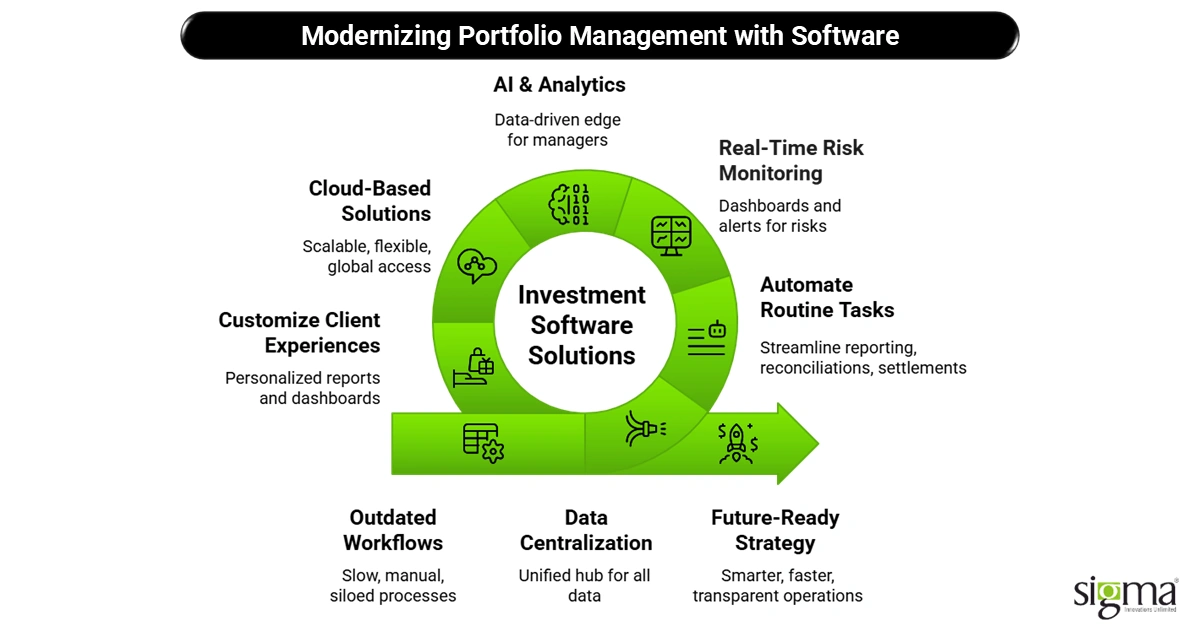
Step 1: Data Centralization & Clean Integration
Most firms juggle multiple tools—CRMs, ERPs, trading systems—that don’t always talk to each other. The first step is to consolidate these into a single, unified hub. With custom fintech software development, Sigma Infosolutions helps firms break down silos so managers can pull all investment data into one view. That means faster access, fewer errors, and a solid foundation for decision-making.
Step 2: Automating Routine Investment Tasks
Manual processes like reporting, reconciliations, and trade settlements slow teams down. By embedding automation into workflows, firms can save hours each week. Our financial software development services streamline these routine tasks so managers can focus more on strategy and client relationships.
Step 3: Enabling Real-Time Risk Monitoring
In volatile markets, waiting until the end of the day for risk reports is too late. Advanced fintech software solutions provide dashboards and alerts for risk-weighted asset tracking in real time. At Sigma, we integrate tools that flag compliance issues or unusual patterns before they become business-critical problems.
Step 4: Leveraging AI & Analytics for Smarter Decisions
AI is a game-changer. By using predictive insights, anomaly detection, and machine learning models, firms can move from reactive to proactive. Our fintech investment solutions give managers a data-driven edge—like having a digital analyst constantly crunching numbers and highlighting opportunities.
Step 5: Scaling with Cloud-Based Solutions
Cloud technology makes it easier (and more cost-effective) to scale. Whether you’re a boutique firm or a large enterprise, cloud-hosted systems provide flexibility, global access, and lower infrastructure costs. Sigma’s expertise in AWS cloud solutions ensures secure, scalable deployment of portfolio management platforms.
Step 6: Customizing Client Experiences
Today’s investors expect more than just numbers. They want clear, personalized reports and easy-to-read dashboards. With our investment software management tools, firms can tailor client communications, providing transparency and building long-term trust.
Each of these steps moves firms closer to smarter, faster, and more transparent operations. And with the right partner—like Sigma Infosolutions—you don’t just adopt technology; you build a future-ready strategy for modern portfolio management.
Emerging Technology Trends in Portfolio Management
The financial industry never stands still, and modern portfolio management is being reshaped by a wave of new technologies. Firms that embrace these innovations are positioning themselves to stay ahead of both market shifts and client expectations.
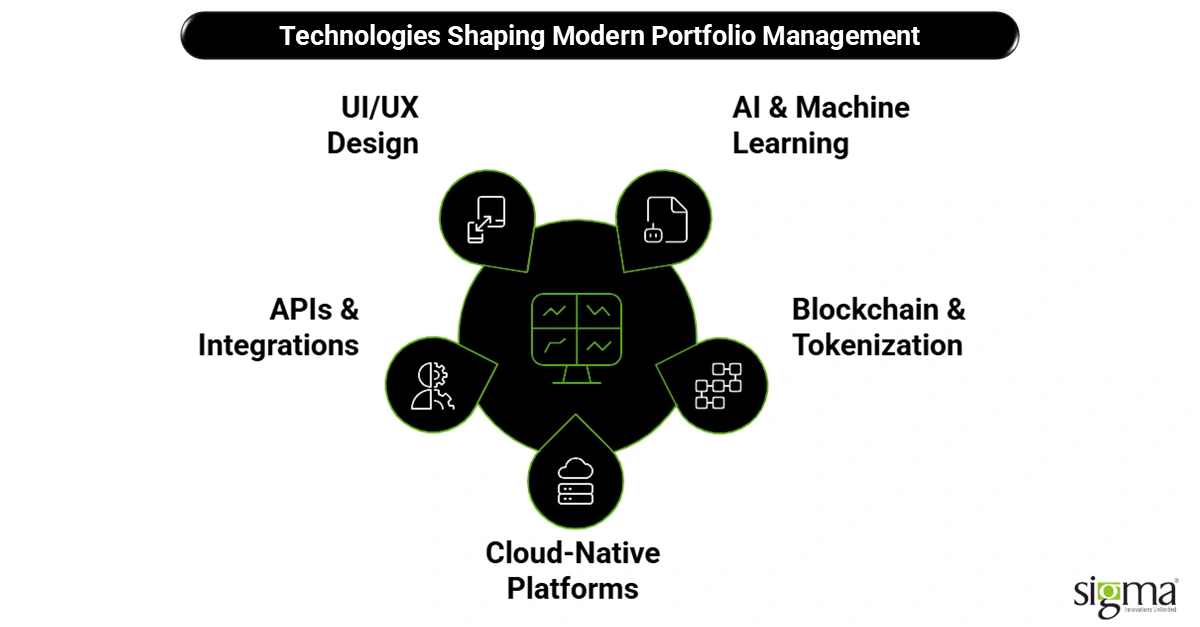
AI & Machine Learning
Artificial intelligence isn’t just a buzzword anymore. From algorithmic trading to robo-advisory services, AI is driving faster, smarter decision-making. With fintech investment solutions that leverage machine learning, firms can detect patterns, automate recommendations, and optimize portfolio strategies at scale.
Blockchain & Tokenization
Blockchain brings transparency and trust into investment management. Tokenization of assets allows for fractional ownership, opening up new possibilities for both institutional and retail investors. For B2B firms, adopting custom fintech software development with blockchain integration enhances security, compliance, and investor confidence.
Cloud-Native Platforms
As investment firms scale, flexibility becomes critical. Cloud-native, SaaS-based financial portfolio tracking software enables real-time collaboration, global access, and lower IT overhead. At Sigma Infosolutions, we deploy cloud-first systems that combine cost-efficiency with enterprise-grade security.
APIs & Integrations
Modern firms can’t afford disconnected tools. Open APIs and seamless integrations across CRMs, ERPs, trading systems, and compliance tools allow firms to operate with a single source of truth. This interoperability is the backbone of effective investment software management.
UI/UX for Investors
Finally, no matter how advanced the backend is, the front end must deliver simplicity. Clean dashboards and intuitive client portals give investors the clarity they demand—fueling transparency and trust. Our financial software development services emphasize UI and UX design to make insights accessible, not overwhelming.
These trends aren’t optional extras. They represent the future of investment management technology—and adopting them now ensures firms stay relevant in a digital-first financial world.
How Firms Benefit from Investment Software
The impact of adopting investment software development solutions becomes clear when you look at how different types of firms are using them to solve real challenges.
Take a mid-sized investment firm, for example. By moving from spreadsheets to a custom-built financial portfolio tracking software, the firm reduced its reporting time by nearly 70%. What once took days of manual reconciliation now happens automatically, freeing analysts to focus on higher-value tasks.
A global wealth manager saw similar benefits by embedding AI models into its systems. With advanced fintech software solutions, the firm began detecting early market anomalies—signals that traditional tools would have missed. This proactive approach not only improved decision-making but also gave the firm an edge in client trust and retention.
Even a boutique firm can scale efficiently with the right tools. Instead of adding more headcount as portfolios grew, the firm leveraged custom fintech software development to automate trade execution, compliance checks, and client reporting. The result? Growth without the growing pains.
At Sigma Infosolutions, we’ve seen time and again that firms of all sizes can transform operations with the right platform. Whether it’s automation, AI, or cloud integration, our financial software development services are built to help businesses scale smarter, not just bigger.
Best Practices for Adopting Investment Software Solutions
Adopting investment software development solutions isn’t just about buying a tool—it’s about aligning technology with business strategy. Here are a few best practices to make adoption smooth and impactful:
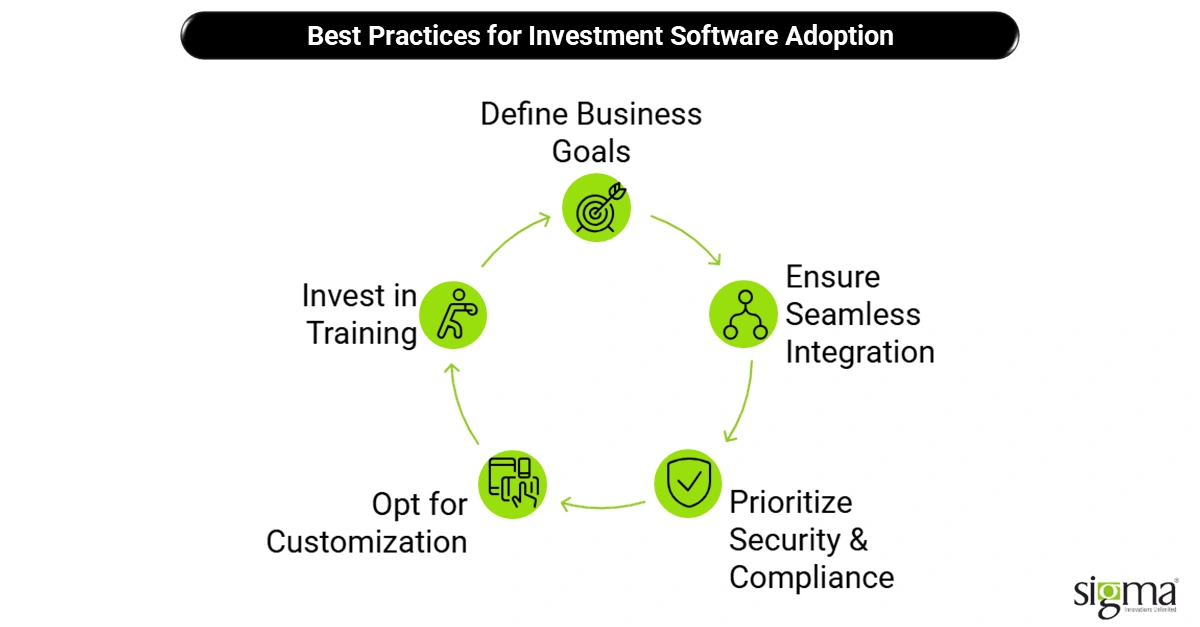
- Define Clear Business Goals: Before jumping in, firms should clarify what they want to achieve—whether it’s faster reporting, better risk analysis, or enhanced client experiences. Clear goals guide the choice of the right fintech software solutions.
- Ensure Seamless Integration: Your new platform should work well with your existing CRMs, ERPs, and trading tools. At Sigma Infosolutions, we build custom fintech software development that avoids silos and creates a single source of truth for managers.
- Prioritize Security & Compliance from Day 1: Regulatory requirements like SEC, FINRA, and MiFID II can’t be an afterthought. The best financial software development services integrate compliance monitoring and reporting into the system from the start.
- Opt for Customization: No two firms are alike. Scalable and customizable investment software management tools ensure that whether you’re a boutique firm or a global enterprise, the software fits your size and strategy.
- Invest in Training & Change Management: Technology works best when people use it well. Ongoing training and clear change management help teams adopt the new system with confidence.
By following these practices, firms set themselves up for long-term success with modern investment management technology—turning adoption into transformation.
The Sigma Infosolutions Advantage
At Sigma Infosolutions, we bring deep expertise in fintech product engineering to help firms reimagine the way they manage portfolios. With more than a decade of experience in delivering financial software development services, we’ve partnered with businesses of all sizes—boutique investment firms, mid-sized managers, and global enterprises—to build scalable and secure platforms.
Our strength lies in blending BI & Analytics, Artificial Intelligence, Salesforce, AWS Cloud, and UI/UX design into seamless investment software development solutions. Whether it’s automating compliance, designing custom dashboards, or integrating CRMs and trading systems, our platforms are tailored to fit your firm’s size and strategy.
Security, compliance, and scalability are at the core of every solution we deliver. From regulatory reporting automation to AI-powered insights, we ensure firms get future-ready tools that empower smarter decision-making and build long-term client trust.
Explore Sigma Infosolutions’ Investment Software Capabilities to future-proof your portfolio management!
Final Thoughts
From advanced analytics to AI-driven automation, it’s clear that modern portfolio management is no longer defined by manual spreadsheets or legacy systems. Instead, the future belongs to firms that embrace investment software development solutions designed to centralize data, streamline workflows, monitor risk in real time, and personalize investor experiences.
The takeaway is simple: firms that don’t move toward digital-first financial software development services risk falling behind competitors who are already leveraging smarter tools. The shift isn’t just about efficiency—it’s about building trust, improving decision-making, and future-proofing portfolio strategies in a volatile market.
At Sigma Infosolutions, we specialize in building fintech investment solutions that combine security, scalability, and customization to fit your firm’s unique needs. Whether you’re a boutique firm scaling operations or an enterprise managing global assets, our platforms are designed to keep you ahead of the curve.

